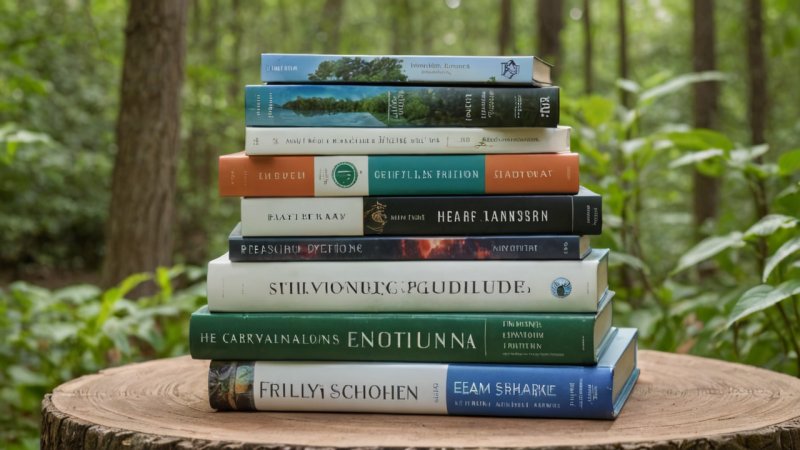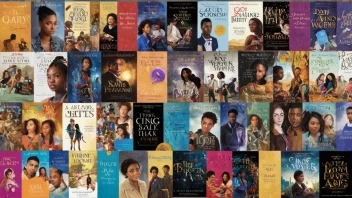Introduction
In a world increasingly concerned with environmental challenges, literature plays a crucial role in shaping our understanding and inspiring action. This article will guide you through the process of selecting bestselling books that focus on environmental issues. We will explore a variety of genres, including non-fiction, fiction, and young adult literature, helping you find compelling reads that illuminate the complexities of our planet's pressing concerns.
Step 1: Identify Your Interests
Before diving into the vast ocean of environmental literature, take a moment to reflect on what specifically interests you. Do you want to learn about climate change, conservation efforts, or perhaps the intersection of environmental issues with social justice? Understanding your interests will guide your selection process.
- Climate Change: Look for books that explain the science behind climate change and its implications.
- Conservation: Seek out stories that highlight efforts to protect endangered species and habitats.
- Environmental Justice: Choose literature that discusses how environmental issues disproportionately affect marginalized communities.
Step 2: Explore Different Genres
Environmental issues are explored across various genres, from gripping non-fiction to thought-provoking fiction. Each genre offers a unique perspective, which can enhance your understanding of the topic.
- Non-Fiction: Look for acclaimed authors like Elizabeth Kolbert, who delve into environmental science and policy.
- Fiction: Discover novels that weave environmental themes into their plots, like Barbara Kingsolver's works.
- Young Adult: Find engaging titles that address environmental issues for younger audiences, such as “The Last Wild” by Piers Torday.
Step 3: Research Bestselling Lists
Once you have a clearer understanding of your interests and preferred genres, it's time to look for bestselling books. Several reputable sources keep track of popular and critically acclaimed titles.
- New York Times Bestsellers: Check out the environmental category for popular reads.
- Goodreads: Explore user-generated lists and reviews to discover trending environmental books.
- LibraryThing: This platform can help you connect with other readers and find recommendations.
Step 4: Read Reviews and Synopses
Once you've identified a few potential titles, it's essential to read reviews and synopses to gauge whether a book will resonate with you. Look for insights from both critics and everyday readers.
“A good book should not just inform but also inspire action.” — Unknown
- Look for Themes: Identify the key themes and messages in the reviews.
- Check Ratings: Higher ratings often indicate a well-received book.
- Author Background: Understanding the author’s expertise can enhance your appreciation of their work.
Step 5: Join Online Communities
Engaging with online book communities can provide you with further insights and recommendations. These platforms allow you to discuss books, share opinions, and learn from fellow readers.
- Social Media: Follow hashtags like #bookstagram or #environmentalbooks on Instagram and Twitter.
- Book Clubs: Join a local or virtual book club focusing on environmental literature.
- Discussion Forums: Websites like Reddit have dedicated sections for book discussions.
Step 6: Make Your Selection
After conducting thorough research and gathering insights, it's time to make your selection. Consider starting with one or two titles that genuinely excite you.
- Purchase or Borrow: Decide whether to buy the book or borrow it from a library.
- Set a Reading Goal: Allocate time in your schedule to read, making it a priority.
- Reflect: After finishing each book, take time to reflect on its impact and how it relates to real-world issues.
Step 7: Share Your Insights
After you've finished reading, don’t keep your insights to yourself! Sharing what you've learned can help inspire others to engage with environmental literature.
- Write a Review: Share your thoughts on platforms like Goodreads or your own blog.
- Discuss with Friends: Encourage discussions about the book with friends and family.
- Engage on Social Media: Post your thoughts on social media to reach a wider audience.
Conclusion
Choosing the right bestselling books that focus on environmental issues can be a rewarding journey. By identifying your interests, exploring different genres, researching bestselling lists, reading reviews, engaging with communities, making thoughtful selections, and sharing your insights, you can deepen your understanding of environmental literature and its significance in today's world. Remember, every book has the potential to inspire change, so happy reading!






